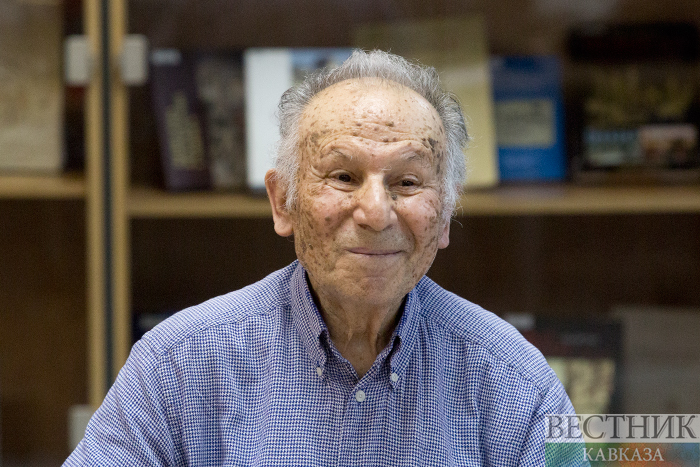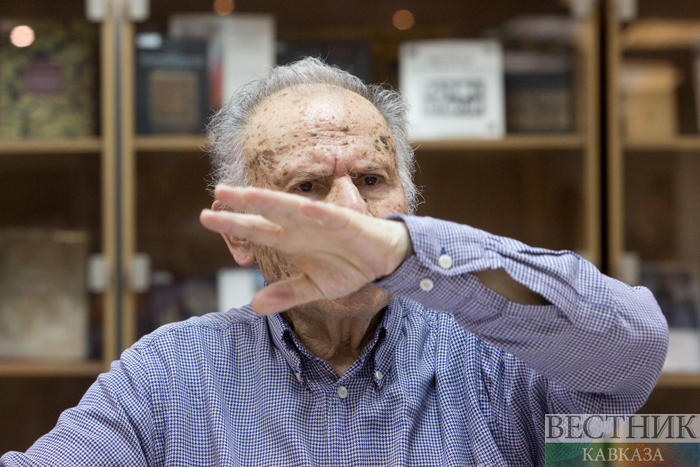A meeting with the Russian-Azerbaijani writer and scholar-scholar, Chingiz Huseynov was held in the All-Russian state library for foreign literature named after M. I. Rudomino, entitled 'About Time and About Me' - a verse from Mayakovsky's poem 'At the Top of My voice'. The distortion of cultural and religious values is one of the sad signs of our time, an Chinigiz Huseynov devoted the most interesting part of his lecture, in the opinion of Vestnik Kavkaza, to it.
"The ethical core of the books of all three religions coincides. They vary in rituals. With the passage of time, rituals were elevated to the absolute. There is a magnificent verse in the Quran on this subject: "If Allah willed, he would have made you one nation: same color and same faith." But God did not do this, because he sees the source of development in competition, in adversity in good deeds between people. Everyone has his own book - God gave the Torah to Jews, the Gospel - to Christians, and the Quran - to new monotheists...
There is no compulsion in faith. It is the fundamental moment in the Quran. If all of it was included in the Quran, then why is there a lot of disgrace in the world associated with the name of Islam? The fact is that, like in other religions, there was a very strong intervention of the so-called human factor. They interfered in the structure of the Quran, and in the chronology of the Quran. And it was not stupid, it was a thoughtful act ..

Millions of people profess Christianity, Islam, and Judaism. This is the reality of today, which can not be ignored ...
I wanted to give an example of the monstrous interpretations of the Quran. There is a verse where God says to Muhammad: "Your only mission is to deliver what you hear from me ... (there were three ways of comprehending - eyes, ears and insides). You do not have to explain anything. You should not be angry ... (although they mocked him, scoffed at him). It is us who will call them to account. This is my task. You have no duty except delivering. You cannot add or delete anything. Only I can delete, only I can add or replace an existing one with the best. "
I accurately conveyed the contents of this verse. There are no language tangles in it. However, on the basis of this verse, there is an abundance of interpretations that, allegedly, when God says that he has deleted something, he means that he deleted the Torah, the Gospel and the Psalms of David as fake books. Such an interpretation of such a simple, clear text. And, unfortunately, there are many such things," Chinigiz Huseynov complained.

He recalled that there are two sources of studying Islam and the life of Mohammed - the Quran, as well as the Sunnah or hadiths, that is, the stories of contemporaries about Muhammad: "Their credibility is measured by long chains leading directly to the contemporary of the prophet who heard these words from Muhammad. I propose to compare the veracity of these judgments with the Quran - to what extent these statements correspond to the spirit of the Quran. That is, the Quran must be a sieve, through which the hadiths will be passed, there are almost a million - a huge number of volumes published. Meanwhile, there are magnificent aphorisms in the hadiths. The best of them was gathered by Lev Nikolaevich Tolstoy, who called them 'Sayings of Mohammed, not included in the Quran'. For some reason, many believed that the Quran was composed by Mohammed. Tolstoy, of course, had in mind the hadiths. Such a little book was published by him".
Chinigiz Huseynov noted Alexander Sergeevich Pushkin's careful attitude and attention to the Quran: "Although Pushkin read the Quran in a terrible translation from French, he understood it very good. Recall his cycle of poems 'Imitation of the Quran' or the poem 'The Prophet' (His shining sword, he clove my breast, Plucked out my quivering heart), which describes the legend of Muhammad. 'The Prophet' was written in those years, when Pushkin was fond of the Quran. But some Russian researchers do not want this to be true.
... One way or another, the Sunnah and hadiths created confusion in the comprehension of the ideas of Islam. They include tremendous aphorisms, but also inadmissible statements attributed to Muhammad, but not complying with the Quran. "






